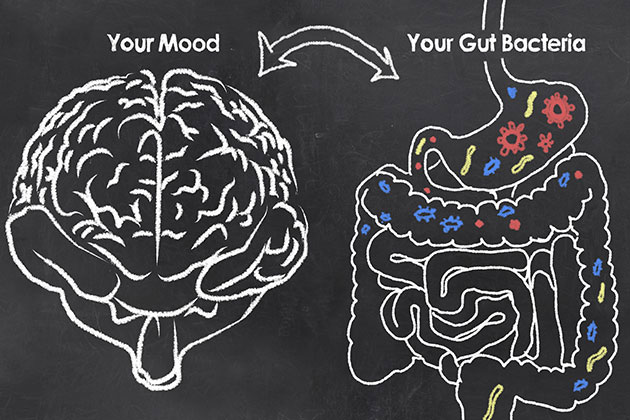Forskere har identifisert flere grupper av bakterier som varierte sammen med depresjon og livskvalitet hos mennesker
Our gastrointestinal (GI) track has a trillion of microorganisms. The microbes which reside in our gut perform important functions and are thought to influence our health by having an impact on diseases like obesity, diabetes and cancer. As researchers are now beginning to better understand this influence at the cellular and molecular level, it is being revealed that abnormal balance of gut bakterie can cause our immune system to overreact and contribute towards inflammation in the GI tract.This can lead to various illnesses throughout the body. In two recent studies1,2, researchers have sequenced the DNA of more than 100 new species of gut microbes making it the most comprehensive list of human gut bakterie up till now. Such a list can be utilized for extensive research on effects of different gut bakterie på menneskers helse.
Finding the link between gut microbes and mental Helse
Research community is intrigued by the possible association of gut microbial metabolism and a person’s mental health and wellbeing. It’s interesting that microbial metabolites could interact with our brain and affect our feelings or behaviour by playing a role in neurological systems. This association has been studied in animal models but not sufficiently in humans. In a first every population study3 publisert i Nature Mikrobiologi, scientists aimed to unravel the exact nature of the relationship between gut bakterie found in human gastrointestinal tract and mental health by gathering evidences that gut bakterie can produce neuroactive compounds.They combined faecal microbiome data with general practitioner diagnose records of depression of around 1100 individuals who were part of the Flemish Gut Flora Project. Mental wellbeing was assessed using different ways including medical tests, doctor diagnoses and self-reporting by participants. By analysing this data,they identified the microorganisms which could have a potential positive or negative impact on mental Helse.
They showed that two bakteriell groups Coprococcus and Dialister were seen to be in consistently low amounts in individuals suffering from depression, whether they were taking antidepressants as a treatment or not. And Faecalibacterium and Coprococcusbacteria were seen to be commonly present in individualswho had a higher quality of life and better mental health.The results were validated in two independent cohort studies, a first consisting of 1,063 individuals who were part of Dutch LifeLinesDEEP and second was a study of patients at University Hospitals Leuven, Belgium who were clinically diagnosed with depression. In one observation, microorganisms could produce DOPAC, a metabolite of human neurotransmitters like dopamine and serotonin which are known to communicate with brain and are linked to better mental health quality.
Beregningsanalyse
A bioinformatics technique was designed which identified exact gut bacteriathat interact with the human nervous system. Researchers utilized genomer på mer enn 500 bakterie in the microorganism’s ability to produce neuroactive compounds in the human gut. This is a first comprehensive catalogue of neuroactivity in the gut which furthers our understanding about how gut microbes participate in producing, degrading or modifying molecules. Computational results will need testing to bolster the claimsbut they do expand our understanding of interactions between human microbiome and the brain.
Da de startet studien, antok forskere at ens mentale helse kan ha en innvirkning på mikroorganismene som kan trives i tarmen og ikke omvendt. Imidlertid ga denne studien bevis på at tarmmikrober "samhandler" på en eller annen måte med nervesystemet vårt ved å produsere nevrotransmittere som er avgjørende for god mental helse. Det er viktig å merke seg at mikroorganismer som eksisterer utenfor kroppen vår, for eksempel i miljøet, ikke er i stand til å lage lignende nevrotransmittere, slik at mikroorganismer kan ha utviklet seg. Dette er en første større studie utført i stor skala på individer som bor på forskjellige geografiske steder. Det kan foreslås at klinisk tilnærming til psykisk helse også kan inkludere probiotika som en ny behandlingsmåte for å øke "gode" bakterier i tarmene våre. Studien må først testes i dyremodeller der spesifikke bakterier vil bli dyrket og deretter dyrets oppførsel vil bli analysert. Hvis det etableres sterke koblinger, kan menneskelige forsøk gjennomføres.
***
{Du kan lese den originale forskningsoppgaven ved å klikke på DOI-lenken nedenfor i listen over siterte kilder}
Source (s)
1. Zou Y et al. 2019. 1520 referansegenomer fra kultiverte humane tarmbakterier muliggjør funksjonelle mikrobiomanalyser. Nature Biotechnology. 37. https://doi.org/10.1038/s41587-018-0008-8
2. Forster SC et al. 2019. En menneskelig tarmbakteriell genom og kultursamling for forbedrede metagenomiske analyser. Nature Biotechnology. 37. https://doi.org/10.1038/s41587-018-0009-7
3. Valles-Colomer M et al. 2019. Det nevroaktive potensialet til den menneskelige tarmmikrobiotaen i livskvalitet og depresjon. Nature Mikrobiologi. https://doi.org/10.1038/s41564-018-0337-xac






































